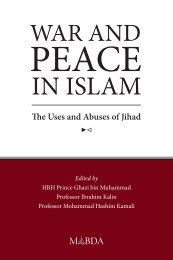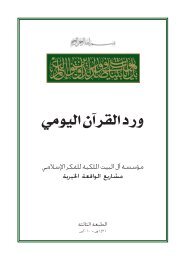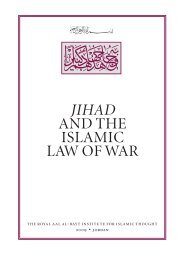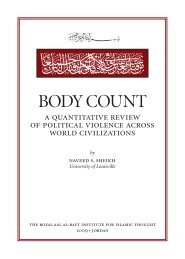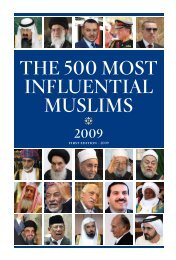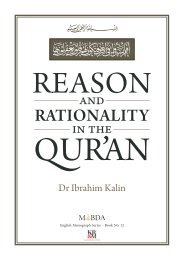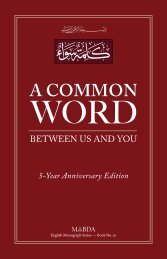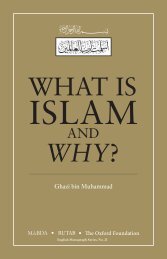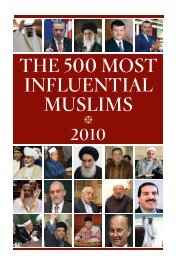Al-W¥^idÏ's Asb¥b al-Nuz‰l - The Royal Islamic Strategic Studies ...
Al-W¥^idÏ's Asb¥b al-Nuz‰l - The Royal Islamic Strategic Studies ...
Al-W¥^idÏ's Asb¥b al-Nuz‰l - The Royal Islamic Strategic Studies ...
Create successful ePaper yourself
Turn your PDF publications into a flip-book with our unique Google optimized e-Paper software.
Asbab <strong>al</strong>-Nuzul<br />
(O ye who believe! It is not lawful for you forcibly to inherit the women (of your deceased kinsmen)…)<br />
[4:19].<br />
Abu Bakr <strong>al</strong>-Asfahani informed us> ‘Abd <strong>Al</strong>lah ibn Muhammad <strong>al</strong>-Asfahani> Abu Yahya> Sahl ibn ‘Uthman><br />
Asbat ibn Muhammad> <strong>al</strong>-Shaybani> ‘Ikrimah> Ibn ‘Abbas (Abu Ishaq <strong>al</strong>-Shaybani mentioned<br />
that ‘Ata’ ibn <strong>al</strong>-Husayn <strong>al</strong>-Suwa‘i <strong>al</strong>so related this tradition, and I do not think he related it from other<br />
than Ibn ‘Abbas) who said regarding the verse (O ye who believe! It is not lawful for you forcibly to inherit<br />
the women (of your deceased kinsmen): “It was the habit that, when a man died, his heirs had a better<br />
right to his wife, if one of them wished he would marry her, if not they married her off to somebody else<br />
or, <strong>al</strong>ternately, leave her unmarried, for they had a better right to her than her own family. This verse was<br />
reve<strong>al</strong>ed about this issue”. 7 This was related by Bukhari in the chapter on Tafsir from Muhammad ibn<br />
Muqatil and he <strong>al</strong>so related it in the chapter on Coercion from Husayn ibn Mansur and both his narrators<br />
related it from Asbat.<br />
<strong>The</strong> commentators of the Qur’an said: “In the pre-<strong>Islamic</strong> and beginning of the <strong>Islamic</strong> eras, if a man<br />
died and was survived by his wife, it was the custom that his son from another wife or his relative from<br />
his clan would come and throw his cloak on that woman, and this gesture entailed that he had a better<br />
right over her than she had on her own person or that anyone else had on her. If he then wished to marry<br />
her, he married her without giving her any dowry, except for the dowry which was given to her by her<br />
deceased husband. <strong>Al</strong>ternately, he could marry her to someone else and take <strong>al</strong>l her dowry, giving her<br />
nothing in exchange. Or, he could leave her unmarried to hurt her so that she would buy herself from<br />
him in exchange for what she inherited from her deceased husband, or wait until she died so that he<br />
inherits her. When Abu Qays ibn <strong>al</strong>-Aslat <strong>al</strong>-Ansari died, he was survived by his wife Kubayshah bint<br />
Ma‘an <strong>al</strong>-Ansariyyah. One of his sons, from another wife, by the name of Hisn (Muqatil stated that his<br />
name was Qays ibn Abi Qays) placed his cloak on her and, thus, inherited the right to her marriage. But<br />
then he left her untouched and failed to provide for her. He did this to hurt her in order to drive her to<br />
buy herself from him with her money. This led Kubayshah to go to the Messenger of <strong>Al</strong>lah, <strong>Al</strong>lah bless<br />
him and give him peace. She said to him: ‘O Messenger of <strong>Al</strong>lah! Abu Qays has died and his son has inherited<br />
the right to marry me. But he has harmed me and is taking his time. He has failed to provide for<br />
me, to consummate the marriage or to let me go free’. <strong>The</strong> Messenger of <strong>Al</strong>lah, <strong>Al</strong>lah bless him and give<br />
him peace, said to her: ‘Remain in your home until <strong>Al</strong>lah reve<strong>al</strong>s something about your matter’. When<br />
she left and the women of Medina heard of this, they went to the Messenger of <strong>Al</strong>lah, <strong>Al</strong>lah bless him and<br />
give him peace, and said: ‘We are in the same situation as Kubayshah except that it is the cousins who had<br />
married us instead of the sons’. <strong>Al</strong>lah, ex<strong>al</strong>ted is He, then reve<strong>al</strong>ed this verse”. 8<br />
(And marry not those women whom your fathers married…) [4:22].<br />
This was reve<strong>al</strong>ed about Hisn ibn Abi <strong>al</strong>-Qays who married the wife of his father Kubayshah bint Ma’an,<br />
<strong>al</strong>-Aswad ibn Kh<strong>al</strong>af who married the wife of his father, Safwan ibn Umayyah who married his father’s<br />
wife Fakhitah bint <strong>al</strong>-Aswad ibn <strong>al</strong>-Mutt<strong>al</strong>ib and <strong>al</strong>so about Manzur ibn Zabban who married the wife<br />
of his father Mulaykah bint Kharijah. 9<br />
Said Ash‘at ibn Sawwar: “When Abu Qays who was one of the righteous people of Medina died, his son<br />
Qays proposed to the wife of his father. She said to him: ‘But I consider you like my son. I will consult the<br />
Messenger of <strong>Al</strong>lah, <strong>Al</strong>lah bless him and give him peace, to see what he commands’. When she went and<br />
informed him, <strong>Al</strong>lah, ex<strong>al</strong>ted is He, reve<strong>al</strong>ed this verse”. 10<br />
(And <strong>al</strong>l married women (are forbidden unto you) save those (captives) whom your right hands<br />
7<br />
Durr, :462-463; Tabari, :305; Qurtubi, :94.<br />
8<br />
Cf. Durr, :463.<br />
9<br />
Durr, :469.<br />
10<br />
Durr, :468.<br />
70



